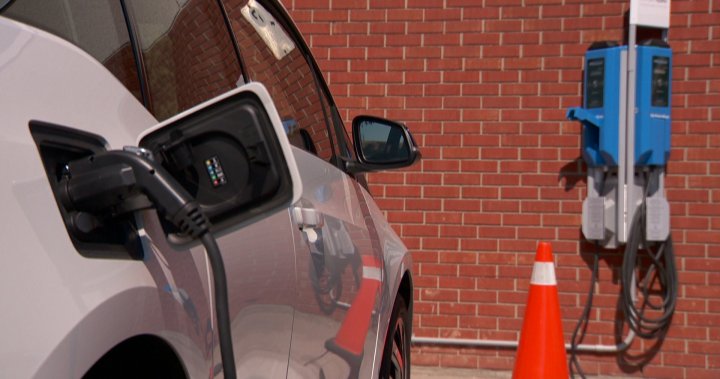By 2028, a Honda manufacturing plant in Alliston, Ont., should be ready to pump out 240,000 electric vehicles (EVs) every single year.
This news was at the centre of a joint announcement from the Trudeau and Ford governments Thursday, marking the third investment in electric vehicle manufacturing in Ontario since 2023.
The announcement comes as the country slowly works towards its goal of achieving 100 per cent zero-emission vehicle sales by 2035 for all new light-duty vehicles.
But with billions of dollars being pumped into EV manufacturing, and thousands of cars poised to hit the market, do Canadians want to buy those cars in the first place?
Getting a firm answer is tough.
A recent national survey by AutoTrader found that EV interest in car buyers has plummetted two consecutive years.
So far in 2024, 46 per cent of respondents who don’t own an EV said they would buy one.
That number is down from 56 per cent interested in 2023, and 68 per cent in 2022.
“A familiar [reason] that we keep hearing over and over is the travel range, and lack of charging station availability is the second one,” said Baris Akyurek, AutoTrader’s VP of Insights and Intelligence.
The survey found other reasons behind EV hesitancy include higher purchasing costs, and the belief that EVs are not suitable for cold weather.
Despite that, electric car purchases have been steadily increasing, according to Statistics Canada.
Financial news and insights
delivered to your email every Saturday.
Of all the country’s new vehicle registrations last year, nearly 11 per cent were zero emission cars — more than 184,500 vehicles.
That number, according to the Electric Vehicle Council of Ottawa (EVCO), is just one of many other signs that show Canadian car buyers are in fact interested in EVs.
“Currently, a lot of EV models that are popular have waitlists that are months-long. Demand has never really been an issue for electric vehicles, its always been on the supply side, of not enough cars going out to consumers,” said Mike Banks of EVCO.
But whether or not Canadians will buy these cars may not be as simple as whether they’re available.
According to Josipa Petrunic, it always comes down to how much the consumer can afford to spend.
So while the AutoTrader survey shows interest in electric vehicles is declining, interest in hybrids is actually on the rise.
That is not a coincidence, says Petrunic, CEO of the Canadian Urban Transit Research & Innovation Consortium.
“Now we’re in this hyper-inflation situation, where peoples mortgages are being hit with high interest rates, people are worried about household credit card debt, so what are they looking for? They’re looking for cheaper cars, with small engines, that cost less to operate. Generally, those are hybrids.”
“Its not that people woke up and decided to be environmentalists. Its that they woke up with less money in their pockets,” she said.
Can Canada handle a transition to electric vehicles?
Banks says many signs point to the national infrastructure being ready for an EV transition — including the electric grid.
“We have seen data from Statistics Canada that shows we could have an instant 25 per cent increase of EV’s on the road, with no changes required whatsoever to the grid … Grid operators know full well that EV transition is underway. They are already preparing for it.”
He also says improvements are underway to increase charger availability, with Tesla opening up its supercharger network to more EVs by 2025. EVCO has also been working to increase chargers in areas like apartment buildings and condos, which typically don’t have them.
Other hesitancy issues, like EVs dying in the cold weather or having less range, are merely ‘myths’ that can be debunked through conversation, according to Banks.
Will a larger supply cool down electric vehicle prices?
Petrunic is highly skeptical that the thousands of cars that will be manufactured in Canada will mean EVs will suddenly become cheaper, at least not before 2040.
While electric batteries being manufactured domestically is ‘great news’, she says the cost of mining the resources and the cost of labour will have to meet the Canadian employment standard of minimum wages.
So unless automakers themselves slash prices, you can expect a “high-price tag for a high-quality product,” she said.
What would help Ontario consumers get into the electric vehicle market, said Banks, is if the Ford government brought back the province’s cancelled EV rebate program, to rally places like Quebec and British Columbia.
© 2024 Global News, a division of Corus Entertainment Inc.




